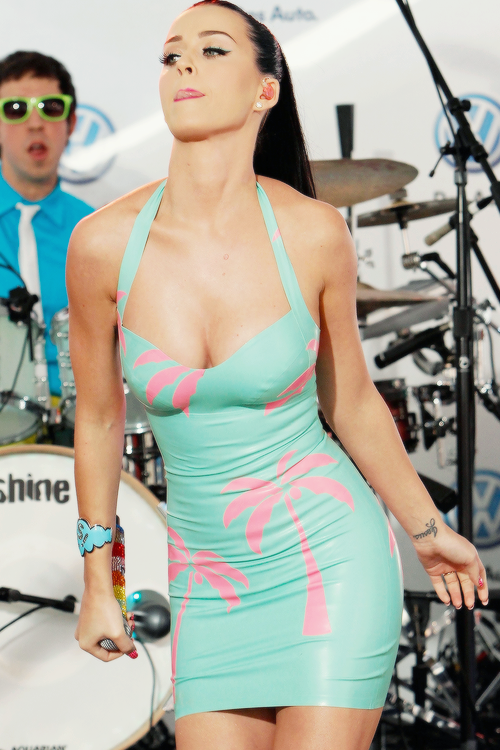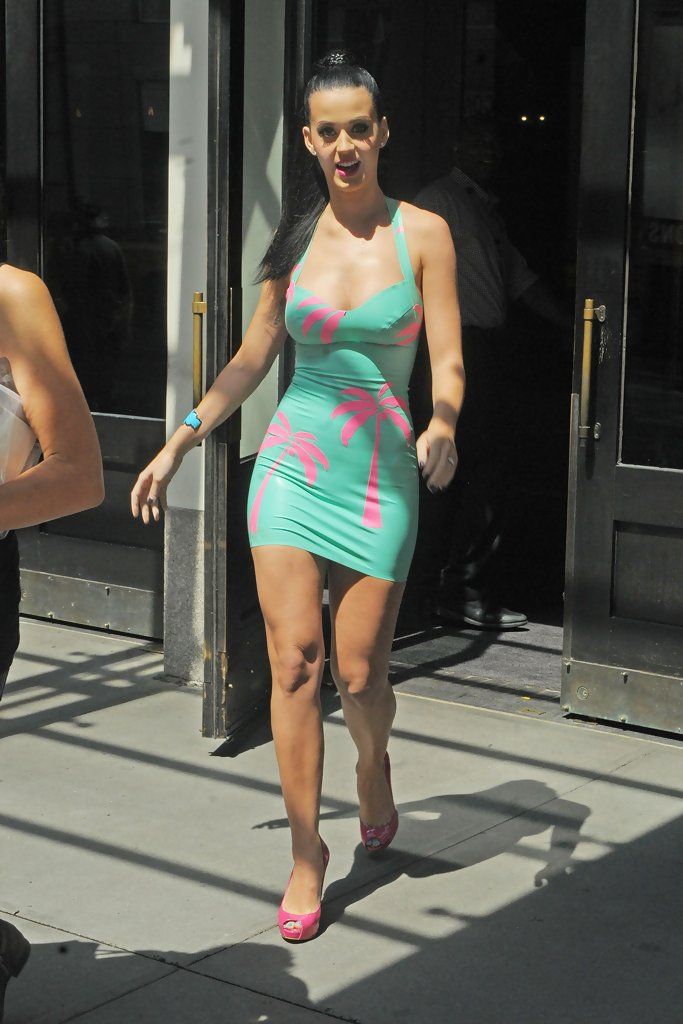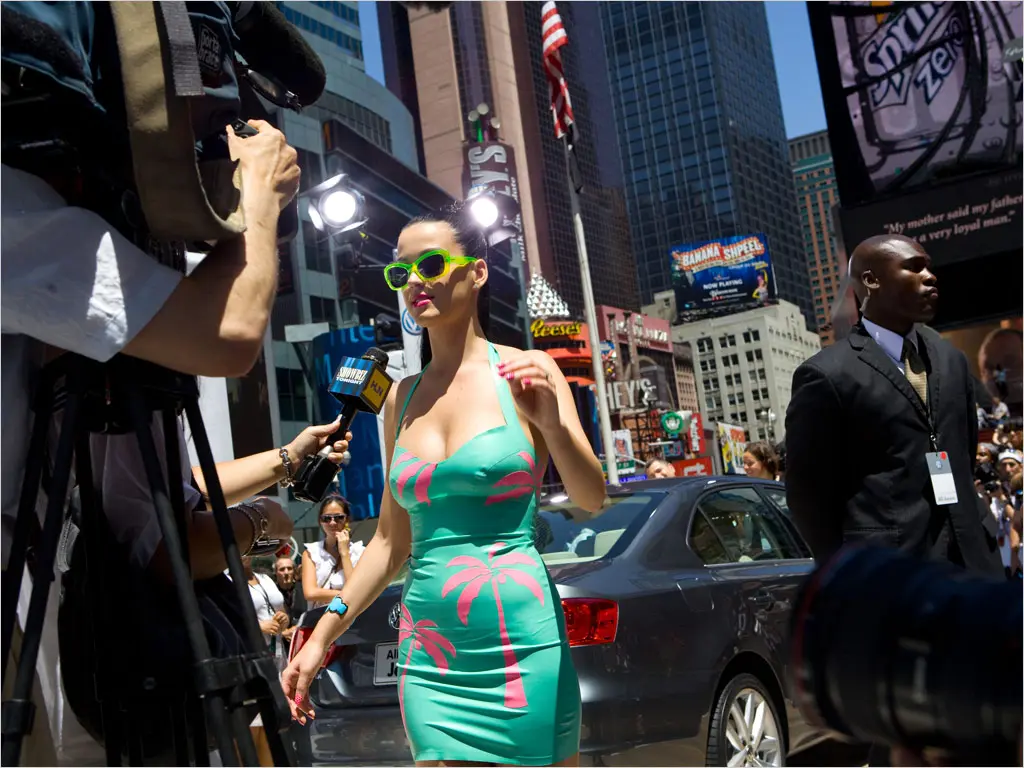
KATY PERRY was sinking. It was a listening party for her new album, “Teenage Dream,” and there was a beach theme, with palm trees, surfboards and gallons of sand trucked in to decorate a Midtown event space. If she were Lady Gaga she might have required a walkway built of trellised stuffed animals or prostrate assistants; instead there were just models in bikinis, eating cotton candy and tossing a beach ball: postcard Americana. Ms. Perry wasn’t happy when she saw the small desert between her and her seat “I don’t want sand in my stilettos,” she said, pouting, echoing one of her lyrics but she is just a regular girl gone big, so she gamely tottered across the sand in her four-inch platforms, the heels disappearing with each step. Wearing flip-flops isn’t really in the pop star playbook.
After introducing a few songs, she posed for photos and signed autographs for the music industry folks in the room, who would help propel singles like “California Gurls” to song-of-the-summer status. “To Shawn Ur a fun-gi,” she wrote on one photo, signing her name with a smiley and two hearts, keeping it clean for a change. The next morning, at a promotional event in Times Square, she was back on familiar ground, miming sexual acts with her microphone for screaming tourists, as she sang and danced around, ending up on top of a Volkswagen. She shed the stilettos that time; no chipping the paint.
What does appear in the modern pop star playbook is this: relentless promotion, corporate crossover, brand development and cheeky over-the-top persona. Over the last few years Ms. Perry, 25, has proved adept at working those angles, making an unlikely turnaround from gospel singer to provocative starlet, while keeping her audience tracking the authenticity of both.
Now she is a chart-topper and pop-culture personality, a gossip page staple thanks to her mouthy tone and her engagement to the similarly raunchy British comedian Russell Brand; you can follow their relationship on Twitter. Their teasing banter is reflected in Ms. Perry’s music, which is full of easy innuendo and breezy sexual references set to a dance beat. She is still, she says, a deeply spiritual person.
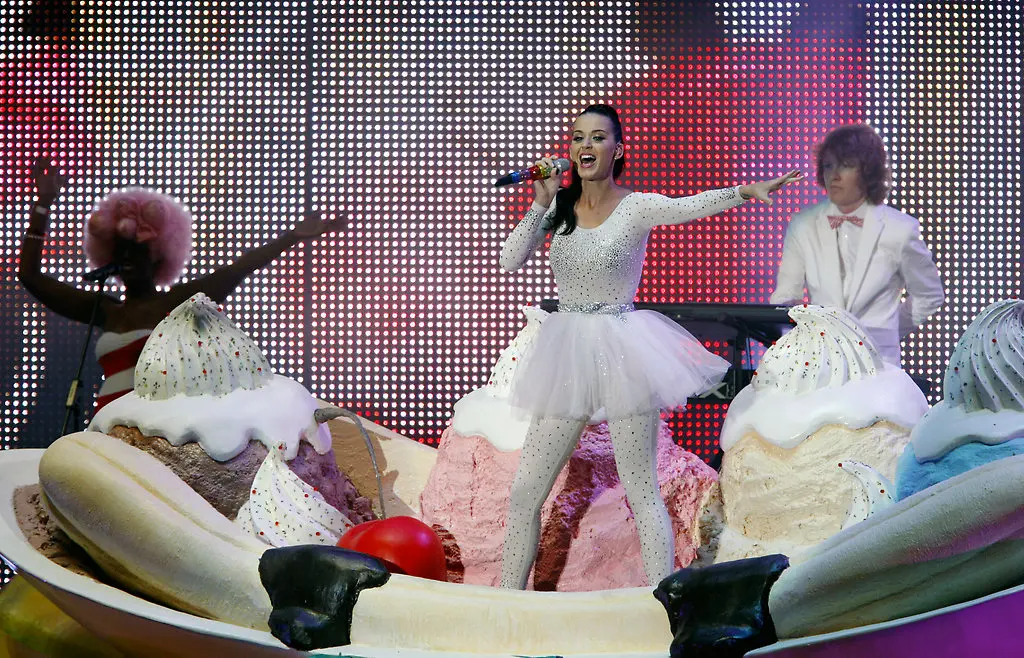
“She has a very distinctive vision,” said Greg Thompson, executive vice president of marketing and promotion for EMI, the parent of Capitol, which will release “Teenage Dream” on Tuesday. “If it’s not something that she doesn’t want, it doesn’t happen. She’s firmly the C.E.O. of Katy Perry.”
Ms. Perry sees it a little bit differently. “I’m definitely on a pilgrimage,” she said. Of course, musicians publicly searching for fulfillment are nothing new. But for Ms. Perry, who was raised as an evangelical Christian and who came to stardom in the midst of a culture of celebrity oversharing, that quest carries a different weight. The tenets of her pursuit might include faith (in herself) and devotion to her craft and a certain kind of self-conscious materialism.
Ms. Perry has not been shy about her ambition. “I never want to walk into this” expletive “restaurant and people go: ‘What does she do again? Who is she?’ ” she said recently over dinner at the Lion, a trendy West Village clubhouse of a restaurant, which Ms. Perry said she chose because of the art on the walls. Being memorable means being visible and being outré, and Ms. Perry is comfortable with both.
She skirted the paparazzi in front of the Lion, mainly because she worried that they would get a too-revealing shot of her gray lace mini-dress as she got out of her car; her style, drawn from retro-modern references like pinups and Japanese Harajuku girls, has made her a favorite of the fashion press. “We’re both like these walking cartoons,” she cheerfully said of herself and Mr. Brand.
Obscenities, too, are a regular part of Ms. Perry’s vocabulary. She is “a drop-dead gorgeous girl,” Mr. Thompson said, with “a truck driver’s mouth.” Though she says she doesn’t take the Lord’s name in vain, she regularly flouts many of the other commandments she grew up with.
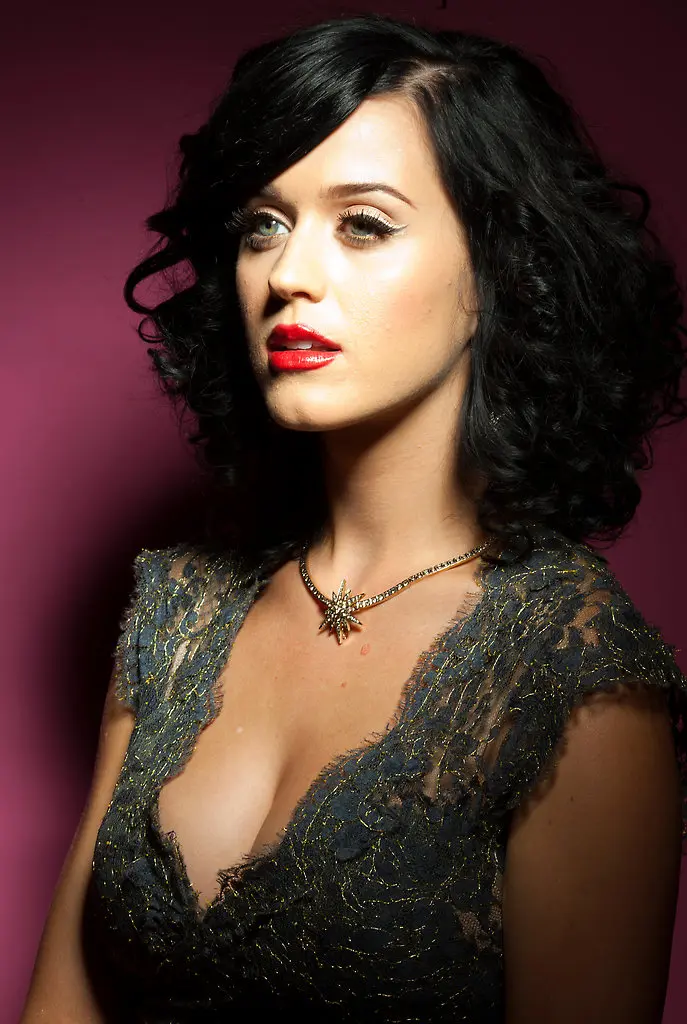
Ms. Perry was born Katy Hudson in California, the middle daughter of itinerant preachers who set up storefront churches and gave sermons around the country. (She uses her mother’s maiden name to avoid confusion with the actress Kate Hudson.) Eventually they settled in Santa Barbara, Calif., where Ms. Perry attended a Christian school that, to her retrospective dismay, did not have “cute or sexy” uniforms, just plain old khaki ones. Her family spoke in tongues at home, and she sang in the church, picking up guitar and writing her own songs at 13, around the time she realized she was “an interesting little oddball,” she said. She was kept away from mainstream pop culture but had some traditional Southern California pleasures; she went to a Christian surf camp where the kids prayed for big waves. “I was sheltered in a weird way,” she said. “It was very, like, pick-and-choose.”
By her early teens she knew she wanted to be a singer. She said she earned her G.E.D. after her freshman year of high school. (Asked if she ever regretted not finishing school, she said: “No, because spell-check exists everywhere.”) With her parents’ help, Ms. Perry got a deal to record a gospel album in Nashville and went on a ministry tour of churches. “At the time I was so jazzed,” she said. “I wanted to be Amy Grant.” But the gospel label folded, and Ms. Perry returned to California, living on her own in Los Angeles at 17.
“When I moved out, with my parents’ blessing, it was like discovering that the world was circular,” she said. Her tastes expanded broadly. “Every genre was my favorite genre. I had no point of reference.”
With gospel off the table, Ms. Perry moved toward rock. She courted Alanis Morissette’s frequent producer, Glen Ballard, and was signed by two major labels, only to be dropped both times. It felt, she said, like: “Here’s your golden ticket. Give me your golden ticket back.” To make ends meet, she worked critiquing demo tapes at a small label in Calabasas, Calif., which she described as the Hoboken of Los Angeles, commuting in rental cars after her car was repossessed. “It wasn’t cute, I’m telling you that,” she said of this period. But, she added, she didn’t doubt that she would succeed. “I thought I was invincible,” she said.
Eventually Ms. Perry was signed to Capitol, which released her debut pop album, “One of the Boys,” in 2008 and sent her on the skate-punk Vans Warped Tour just as her single, “I Kissed a Girl,” was breaking it sold 3.8 million downloads, according to Nielsen SoundScan and was nominated for a Grammy and, not incidentally, stirring controversy. (Her first EP, “Ur So Gay,” a diatribe about an effeminate boyfriend, did not help.)
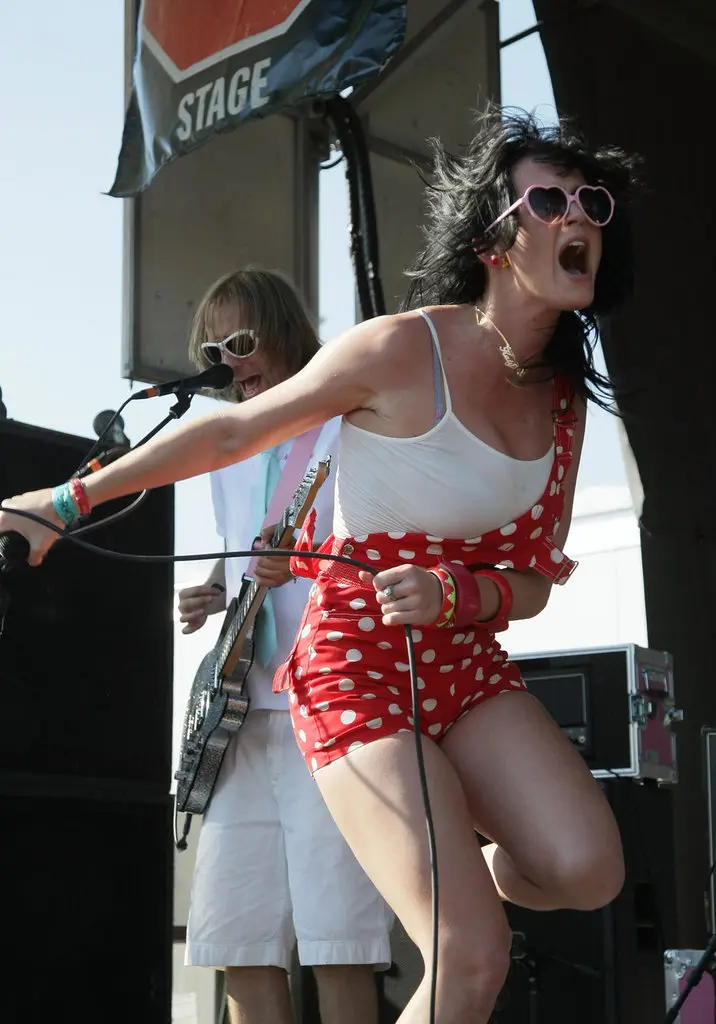
“A lot of people criticized it for playing into masculine fantasies as opposed to saying something new about gender politics,” said Sadie Stein, a contributing editor at the blog Jezebel, who has followed Ms. Perry’s career. She paused, considering that statement. “It seems silly to even say that,” she said.
It was, after all, just pop: that was Ms. Perry’s line of defense, to call her work lightweight, fun, throwaway. (She has also spoken in support of gay marriage.) Still, her credibility has been questioned throughout her career: is she a symbol of rebellion or a rote representation of a good girl gone bad, a manufactured product of the music industry or an individual with a loopy sense of style, blah blah blah, but can you dance to it?
The answers are mostly yes: “Teenage Dream” sticks to a radio-friendly formula, with a few silly songs (“Peacock”), ballads and power anthems (“Firework,” which Ms. Perry called her favorite song) thrown in. She did not want to make a woe-is-me sophomore album, she said, or, worse, one about being rich and famous. Mr. Thompson of EMI credited her past failures with her ability to be relatable even as she ascended to stardom. “California Gurls” has spent more than three months at or near the top of the Billboard Hot 100, where it was recently joined by the title track from “Teenage Dream”; “One of the Boys” went platinum. (“MTV Unplugged: Katy Perry,” from 2009, was not well received.)
Ms. Stein noted that, unlike Lady Gaga the totem to all female pop singers these days Ms. Perry is not very threatening, obscenities and innuendo notwithstanding. “She hews to the model of a pretty girl being pretty and filling feminine roles, really while nominally subversive,” she said. “She might be winking, but the rest of her body is pretty naked while she does it.”
Just how much of Ms. Perry’s work is delivered with a wink is an open question. Certainly she has a taste for camp: the package for “Teenage Dream” is meant to smell like cotton candy. The video for “California Gurls” is set in a demented Candy Land where candy canes turn into snakes and gummi bears give the finger; at the end she shoots whipped cream out of cannons attached to her breasts. It’s a canny move to declare yourself a cartoon before anyone else can do it.
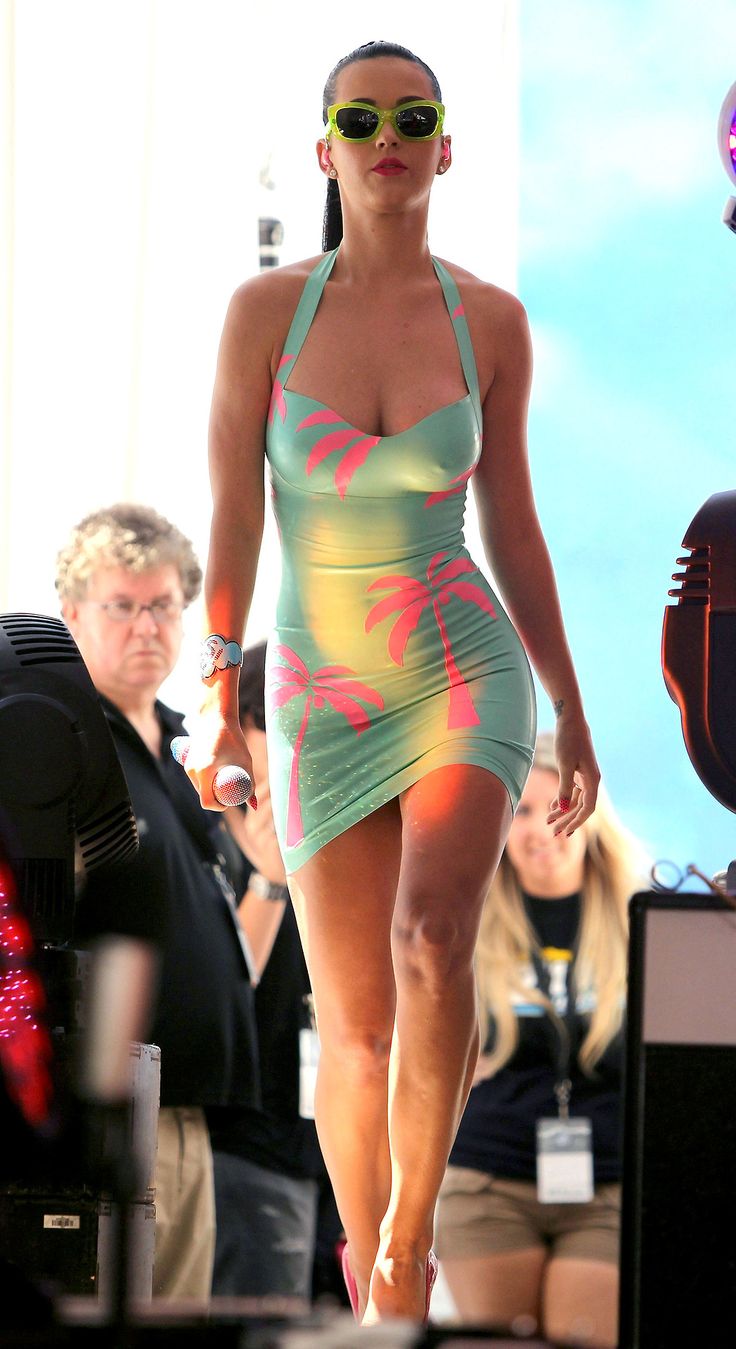
“God, that song is so annoying,” Ms. Perry said, when “California Gurls” came on at one of her promotional appearances. Fulfilling her many meet-and-greet duties, fine-tuning her image and hyping her album, she sometimes appeared bored. Who could blame her? There were greater things to contend with.
Like how to transport a stuffed, chair-size hamburger and side of fries that she had bought for her home with Mr. Brand. “Pop star problems,” she joked. She values cuteness “Ready, spaghetti,” she’ll say but is more biting than gee-whiz. She’s a fan of Die Antwoord, a raunchy South African rap group with a pixie frontwoman; she turned up to see them last month, dancing offstage with Mr. Brand, his shirt barely buttoned, behind her.
Also, the afterlife that’s constantly on her mind, she said over dinner, as she contemplated the vagaries of fame. “How much alcohol can you drink, how much things can you buy because at the end of the day it’s just you in that casket,” she said, throwing in a few expletives for damnable measure.
Having been raised with the image of hellfire and the sense that earthly pleasures are temporary translates to a bit of darkness in her work. In “Who Am I Living For?” she sings, “I can see the heavens, but I still hear the flames calling out my name.” Even the saccharine “California Gurls” video has a moralizing message. “It’s not all sweet,” she said. “You can’t overindulge, because then you get in trouble.”
Ms. Perry credits Mr. Brand with keeping her stable, and her parents still pray for her. But she sees no contradiction in her oddball trajectory. “I am, because I made me,” she said, before amending herself: “God made me, but I tried to make it happen.”
What would her 15-year-old-self, the one whose teenage dream it was to be a gospel star, think of her life now?
“I think the 15-year-old me would be excited and flabbergasted,” Ms. Perry said, “and also say, ‘Put on some clothes.’ ”
